Oberlin Conservatory Symphony Orchestra
The Oberlin Conservatory Symphony Orchestra has been the pride of the Conservatory since 1896. The orchestra has a rich history of notable guest conductors including Igor Stravinsky, Pierre Boulez, Sir Simon Rattle, Robert Shaw, and John Williams. Many professional conductors trained at Oberlin, among them Robert Spano ’83, music director for the Atlanta Symphony; Edwin London, 2001 recipient of the Ditson Conductor's Award from Columbia University; David Zinman, music director of the Tonhalle Orchester Zurich, and the Aspen Music Festival and School; and Michael Christie, music director of the Brooklyn Philharmonic and the Phoenix Symphony.
Recent appearances by Oberlin’s orchestra include a performance at Cleveland’s Severance Hall and a 13-day tour of China, under the baton of music director and conductor Bridget-Michaele Reischl, and a critically acclaimed performance at Carnegie Hall in January 2007, conducted by Robert Spano. Recent live recordings for the Oberlin Music label include The Oberlin Chamber Orchestra with soprano Alyson Cambridge, conducted by Sir Simon Rattle, and The Oberlin Orchestra in China, conducted by Maestro Reischl. Forthcoming is The Oberlin Conservatory Symphony Orchestra at Carnegie Hall, conducted by Maestro Spano. Reischl has been music director of the Oberlin Orchestras since 2005.
Meet the Oberlin Conservatory Symphony Orchestra
VIOLIN I
Dechopol Kowintaweewat, Concertmaster
Nina Soderberg,
Associate Concertmaster
David Bogorad
Priscilla Tsai
Shawn LeSure
Ran Cheng
Samantha Bounkeua
Holly Jenkins
Joseph Stepec
Danielle Taylor
Carol Cubberley
Paul Hauer
Sarah Martin
Amy Hess
Nathan Lesser
VIOLIN II
Jenny Elfving, Principal
Leah Asher,
Associate Principal
Rachel Bundy
Lisa Goddard
Marina Kifferstein
Samuel Taggart
Sara Sasaki
Addison Teng
Maya Bennardo
Myra Hinrichs
Erena Lee
Mawugbo Betty Collins
Jirair Alex Youssefian
Summer Lusk
Dorothea Talento
VIOLA
Meredith Crawford, Principal
Lianna Dugan,
Associate Principal
Jane Mitchell
Abigail Rojansky
Elisa Rega
Daniel Fellows
Caroline Curatolo
Thomas McShane
Emily Baker-White
Colin Wheatley
DJ Cheek
Kyle Aungst
VIOLONCELLO
Mary Auner, Principal
— SHANE FOUNDATION
ENDOWED CHAIR
April Dannelly,
Associate Principal
Leah Metzler
Eleanor Bors
Stephanie Smith
Glenna Curren
David Ellis
Scott Ness
Rebecca Landell
Meredith Bowden
BASS
Nishana Gunaratne, Principal
Christopher Pike, Associate Principal
Adam Bernstein
Eugene Theriault
Emma Dayhuff
Zachary Hobin
Erin Lobb
FLUTE
Paul Hively
Elise Roy
Nelson L. Wong M
Peng Zhou H, B
PICCOLO
Paul Hively
Peng Zhou
OBOE
David Barford M
David Cyzak B
Anahid Gregorian
Rachel Messing H
ENGLISH HORN
Anahid Gregorian
CLARINET
Mark Cramer M
Kei Funaguma
Sean Lucius H
Curt Miller B
BASSOON
Michael Matushek H, M
Andrew Pattison
Max Pipinich B
HORN
Matthew Berliner
William Eisenberg
Brandon Henley
Nicolee Kuester M
Matthew McLaughlin
Tyler Stoll
Katie Swaydis H
Elizabeth Upton B
TRUMPET
Nathaniel Cox H
Michael Davis
Emily Lawyer B
Jonathan Morales
Philip Parsons M
TROMBONE
Jacqueline O’Kelly
Berk Schneider H, M
Andrew Wainacht
BASS TROMBONE
Christian Behrens
TUBA
Jonathan Seiberlich
TIMPANI
Jake Harkins
Sindre Saetre
PERCUSSION
Edward Atkinson
Neil Ruby
Christian Smith
HARP
Juliana Beckel
ENSEMBLE LIBRARIAN
& OPERATIONS MANAGER
Michael Roest
Winds & Brass are listed
alphabetically.
Superscripts
indicate
principal players:
H = Huang Ruo
B = Beethoven
M = Mahler
The Orchestra: A Brief History
Back in 1896, very few people were violin or cello majors, and no one majored in any of the wind instruments. Professors Fred and Charles Doolittle taught violin and cello; Professor J. Arthur Demuth taught violin, cornet, horn, trombone, oboe, and clarinet; and Charles Doolittle, taught flute. Their valiant efforts made possible the formation that year of a Conservatory Orchestra with Professor George W. Andrews as conductor.
In 1916 the string and wind instrument students at the Oberlin Conservatory of Music were a small group. The addition of instructors Maurice Kessler, violinist from the Boston Symphony, and Friedrich Goerner, former first cellist with the Pittsburgh Symphony, had strengthened the department, but of the 13 students studying with Mr. Goerner, only one was a cello major.
At this time the Conservatory Orchestra under Professor Andrews included 40 musicians and consisted of one flute, one clarinet, two trumpets, three horns, trombone, timpani, and strings. Until the 1930s the missing parts would be supplied by organist Bruce Davis, who through long experience and great ability had acquired an enormous deftness in this task. Willard Warch was a member of the Orchestra's cello section 1927-31. In his history of the Oberlin Conservatory of Music, Our First 100 Years, from which this account is taken, he recalls looking out over the orchestra at a typical rehearsal and saying, "Bruce! Today we need second flute, second oboe, both bassoons, and third and fourth horns." And that, wrote Warch, is what he gave them, or at least the essentials.
In the years before the 1950s, the orchestra also had the assistance of other faculty members. Arthur Heacox had studied string bass in Munich and Paris and served the orchestra faithfully as bassist—sometimes the only one—for years. When he retired, he persuaded Don Morrison, of violin and music education, to be his successor. Victor Lytle of the theory department was the orchestra timpanist for several years. Professor Andrews himself, while a student in the 1870s, had learned trombone in order to help the orchestra of that time.
Demuth, in 1916, played some of the winds or strings, as did his successor of the 1920s, R. Walter Frederick. The violin and cello teachers, of course, filled the first chairs of their instruments, and even the College faculty helped. Jameson played horn. Professor and Mrs. Wolfgang Stechow played viola, and Dean Carl F. Wittke of the College of Arts and Sciences first played viola and then string bass. When Arthur Williams came in 1928, he played horn on occasion as well as trumpet. Yet the outstanding record of assistance to the Oberlin Orchestra and Bands belongs to George Waln, who, at one time or another, played B-flat clarinet, E-flat soprano clarinet, alto clarinet, bass clarinet, flute, English horn, bassoon, and contrabassoon.
A notable professor of orchestral conducting from 1966 to 1983 was Robert Baustian. The pantheon of conductors on the classical music scene who trained at Oberlin includes David Zinman ’58, Robert Spano ’83, Raymond Harvey ’73, Michael Morgan ’73, Jeannette Sorrell ’92, Edwin London ’52, John Kennedy ’82, David Hoose ’69, Stephen Gunzenhauser ’63, and Michael Christie ’96.
Selected source material from Our First 100 Years by Willard Warch.
Artists in Los Angeles
Bridget-Michaele Reischl, conductor
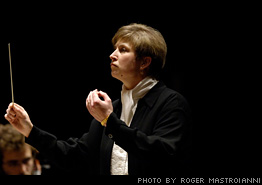
Bridget-Michaele Reischl is music director of the Oberlin Orchestras and associate professor of conducting at the Oberlin Conservatory of Music. In 2005-06, she led the Oberlin Conservatory Symphony Orchestra on a concert tour of China. A recording from that tour, The Oberlin Orchestra in China, was released in 2007 on the Oberlin Music label.
Since becoming the first American to win Italy’s Antonio Pedrotti International Conducting Competition in 1995, Reischl has been an active guest conductor throughout the United States and internationally, appearing with such orchestras as the Atlanta and Milwaukee symphonies and the Brooklyn Philharmonic. She is also music director of the Green Bay Symphony Orchestra in Green Bay, Wisconsin, a position she has held since 2001. From 1992 to 2004, she was music director of the Lawrence Symphony Orchestra and associate professor of conducting at the Lawrence University Conservatory of Music in Appleton, Wisconsin.
She is a graduate of the Eastman School of Music. As a student of Robert Spano (a 1983 Oberlin graduate), she continued her studies as a conducting fellow at both the Aspen and the Tanglewood music festivals, where she worked with Seiji Ozawa, Murray Sidlin, and David Zinman (also an Oberlin graduate, Class of 1958).
Reischl has recorded on the Velut Luna, CRI, and Sea Breeze Record Company labels. Reischl conducts Oberlin 21, a string orchestra comprising 21 exceptional young artists from the Oberlin Conservatory, on the Telarc release Air, a new recording of works by Debussy and Takemitsu that features internationally acclaimed harpist Yolanda Kondonassis, Assistant Professor of Harp at Oberlin. In the summer of 2008, she conducted Mozart’s Marriage of Figaro in Arezzo, Italy, as part of the Oberlin in Italy program.
She has been a member of the faculty at the Oberlin Conservatory of Music since 2005.
Angela Cheng, piano
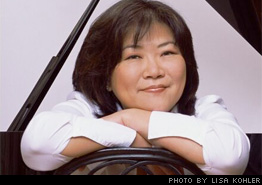
Consistently cited for her brilliant technique, tonal beauty, and superb musicianship, Angela Cheng is one of Canada’s brightest stars. She has appeared as soloist with virtually every orchestra in Canada, as well as the Alabama, Colorado, Houston, Indianapolis, Jacksonville, Saint Louis, San Diego, Syracuse, and Utah symphony orchestras; the Buffalo and Louisiana philharmonic orchestras; and the Israel Philharmonic, among others.
Cheng’s debut recording of two Mozart concerti with Mario Bernardi and the CBC Vancouver Orchestra received glowing reviews. Other CDs include Clara Schumann’s Concerto in A Minor with JoAnn Falletta and the Women’s Philharmonic (Koch International) and the selected works of Clara and Robert Schumann, four Spanish concerti with Hans Graf and the Calgary Philharmonic, and both Shostakovich concerti with Mario Bernardi and the CBC Radio Orchestra (for CBC Records). Her most recent release is an all-Chopin recital CD for Universal Music Canada.
Cheng appears regularly on recital series throughout the United States and Canada and she has collaborated with numerous chamber ensembles, including the Takács, Colorado, and Vogler quartets. Her many festival appearances include Chautauqua, Colorado, Houston, Vancouver, and the Festival de Lanaudière in Quebec.
Cheng was the 1986 Gold Medal winner at the Arthur Rubinstein International Piano Master Competition and the first Canadian to win the prestigious Montreal International Music Competition for piano (1988). In the same year, the Canada Council awarded her its coveted Career Development Grant. For her outstanding interpretations of Mozart, she received the Medal of Excellence at the Mozarteum in Salzburg in 1991.
Cheng is associate professor of piano at the Oberlin Conservatory of Music. She joined the faculty in 1999. Read more about Cheng.
Huang Ruo ’00, composer
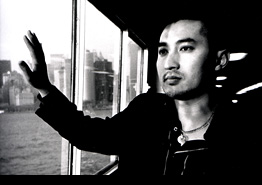
Huang Ruo is the 2008 winner of the International Composition Prize, sponsored by the Luxembourg Society for Contemporary Music. He also won the competition’s special audience award. Hailed by the Wall Street Journal as “strikingly assured,” Ruo’s music has been performed by the Philadelphia Orchestra under Wolfgang Sawallisch, the New York Philharmonic under Xian Zhang, the Juilliard Symphony under James Conlon, the American Composers Orchestra under Dennis Russell Davies, the Asko Ensemble under Ilan Volkov, the Nieuw Ensemble under Ed Spanjaard, the Dutch Vocal Laboratory, the Chamber Music Society of Lincoln Center, the Da Capo Chamber Players, the Albany Symphony under David Alan Miller, and many other ensembles.
His music has been played in Carnegie Hall’s Zankel Hall and Weill Recital Hall, Avery Fisher Hall and Alice Tully Hall at Lincoln Center, Miller Theatre at Columbia University, Symphony Space (New York), the Academy of Music (Philadelphia), the Chicago Museum of Contemporary Art, the Chicago Cultural Center, the Harris Concerto Hall (Aspen), the Muziekgebouw aan ’t IJ and Paradiso (Amsterdam), the Shanghai Concert Hall, and the Hong Kong City Hall cultural complex. In 2003, Miller Theatre featured him on its Composer Portraits series, for which his four chamber concertos were premiered as a cycle by the International Contemporary Ensemble (ICE). New York Times critic Allan Kozinn hailed the concert as the second on the list of his “Top Ten Classical Moments of 2003.”
In February 2007, Naxos Records released his Chamber Concerto Cycle on its acclaimed American Classics series, and his orchestral lyric Leaving Sao was released on Albany Records in 2008. Planned CD releases include Divergence on Koch Records and The Three Tenses on Summit Records. A frequent winner of the American Society of Composers, Authors, and Publishers (ASCAP) Concert Music Award, Ruo’s work has been spotlighted on National Public Radio (NPR), Radio Finland, Radio Sweden, Radio-Amsterdam, Radio-Canada and Radio-China.
Huang Ruo was born in Hainan Island, China, in 1976, the year the Chinese Cultural Revolution ended. His father, who is a well-known composer in China, began teaching him composition and piano when he was 6 years old. Growing up in the 1980s and 1990s, when China was steadily opening up its gates to the Western world, he received both traditional and Western education at the Shanghai Conservatory of Music. He was admitted into its composition program, studying with Deng Erbo when he turned 12.
As a result of the dramatic cultural and economic changes in China following the Cultural Revolution, his education expanded from Bach, Mozart, Stravinsky, and Lutoslawski to include the Beatles, rock and roll, heavy metal, and jazz. Huang Ruo was able to absorb all of these newly allowed Western influences without inhibiting factors. As a member of the new generation of Chinese composers, he clearly knows that his goal and task is not just to simply mix both Western and Eastern elements, but to go beyond that to create a seamless synthesis and a convincing organic unity, drawing influences from various genres and cultures.
After winning the Henry Mancini Award at the 1995 International Film and Music Festival in Switzerland, he moved to the United States to further his education. Since then, he has earned a Bachelor of Music degree from the Oberlin Conservatory of Music and Master of Music and Doctor of Musical Arts degrees in composition from the Juilliard School. Randolph Coleman and Samuel Adler were among his composition teachers.
Ruo is currently a member of the composition faculty at SUNY Purchase. He is a permanent resident of the United States and a member of ASCAP. Read more about Ruo. Hear Ruo discuss his composition for Oberlin.
Panelists in Los Angeles
Elizabeth Baker '76, Violinist, The Los Angeles Philharmonic
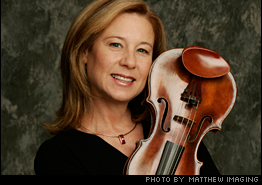
Violinist Elizabeth Baker, who joined
the Los Angeles Philharmonic in 1987, has been particularly acclaimed
for her performances of contemporary music. In 1992, she was the violin
soloist in the Philharmonic’s acclaimed performances of Tippett’s
Triple Concerto, conducted by André Previn. In the 1997 season
she presented the Los Angeles premiere of Janácek’s Violin Concerto,
conducted by Sian Edwards. She has given numerous West Coast and world
premieres of works by composers such as Arvo Pärt, Philip Glass, Don
Davis, Vincent Plush, William Bolcom, Donald Crockett, and Charles Amirkhanian.
Baker performs on the Philharmonic’s
Chamber Music Society and Green Umbrella series. She was a member of
the Los Angeles-based contemporary ensemble, Xtet, for 16 years and
she continues to perform throughout the Western United States with the
baroque ensemble Bach’s Circle. She is featured in recordings on the
Hänssler Classic, Delos, New World, and Crystal Records labels.
Prior to joining the Los Angeles Philharmonic, Baker was a member of the San Francisco Symphony for 10 years. She appeared frequently as soloist with orchestras in the Bay area as well as in recitals and in chamber music engagements. She earned a Bachelor of Music degree from the Oberlin Conservatory of Music as a student of Andor Toth. Further study with Josef Gingold at Indiana University led to a Master of Music degree as well as the coveted Performer's Certificate. Baker has been on the faculty at the California Institute of the Arts since 1993.
David Lang, Composer and Distinguished Visiting Professor of Composition
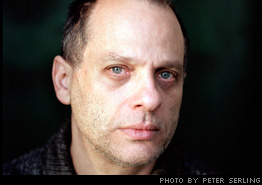
American composer David Lang received the 2008 Pulitzer Prize in Music for The Little Match Girl Passion, a work for four solo voices and percussion based on the Hans Christian Andersen fable of the same name. The work was co-commissioned by the Carnegie Hall Corporation and the Perth Theater and Concert Hall. It premiered October 25, 2007, in Zankel Hall at Carnegie Hall in New York City.
Los Angeles Times music critic Mark Swed wrote that “there is no name yet for this kind of music” when he described the works of Lang. Audiences around the globe, however; are hearing more and more of it: in performances by the Santa Fe Opera, the New York Philharmonic, the San Francisco Symphony, the Cleveland Orchestra, and the Kronos Quartet; at Tanglewood, the BBC Proms, the Munich Biennale, the Settembre Musica Festival, the Sydney 2000 Olympic Arts Festival, and the Almeida, Holland, Berlin, Strasbourg and Huddersfield festivals; in theater productions in New York, San Francisco, and London; in the choreography of Twyla Tharp, La La La Human Steps, the Nederlands Dans Theater and the Royal Ballet; and at Lincoln Center, the South Bank Centre, Carnegie Hall, the Kennedy Center, the Barbican Centre, and the Brooklyn Academy of Music.
Recent projects include Writing On Water for the London Sinfonietta with visuals by English filmmaker Peter Greenaway; The Difficulty of Crossing a Field, a fully staged opera for the Kronos Quartet; and Loud Love Songs, a concerto for the percussionist Evelyn Glennie. He also wrote the oratorio Shelter with co-composers Michael Gordon and Julia Wolfe at the Next Wave Festival of the Brooklyn Academy of Music, staged by Ridge Theater and featuring the Norwegian vocal ensemble Trio Mediaeval.
Lang has received numerous honors and awards including the Rome Prize, the BMW Music-Theater Prize (Munich), and grants from the Guggenheim Foundation, the Foundation for Contemporary Performance Arts, the National Endowment for the Arts, New York Foundation for the Arts, and the American Academy of Arts and Letters.
Lang received a Bessie Award in 1999 for his music for choreographer Susan Marshall’s The Most Dangerous Room in the House, performed live by the Bang on a Can All-Stars at the Next Wave Festival of the Brooklyn Academy of Music. The Carbon Copy Building won the 2000 Village Voice OBIE Award for Best New American Work. New Yorker magazine named Lang's CD recording, The Passing Measures, one of the best CDs of 2001.
His most recent recording, ELEVATED (on Cantaloupe), comprises three atmospheric and meditative pieces on CD accompanied by a DVD of the same three pieces interpreted by noted visual artists William Wegman, Bill Morrison, and Matt Mullican.
Lang is cofounder and co-artistic director of New York’s legendary Bang on a Can and professor of music composition at the Yale School of Music. Music labels Sony Classical, Teldec, BMG, Point, Chandos, Argo/Decca, Caprice, CRI, and Cantaloupe have recorded his music. Red Poppy (ASCAP) publishes his music, which has a worldwide distribution by G. Schirmer, Inc. Read more about David Lang and Bang on a Can.
David H. Stull, Dean of the Conservatory
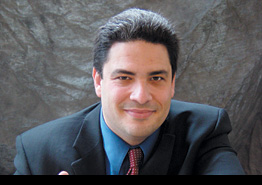
David H. Stull has been dean of the Oberlin Conservatory of Music since 2004. Prior to his appointment as the Conservatory’s chief academic officer, he served four years as Oberlin’s associate dean, and one semester as acting dean. He also chaired Oberlin’s Educational Policy Committee for the Conservatory.
Before joining Oberlin, Stull was a member of the brass faculty, the director of Conservatory admissions, and ultimately the assistant dean of the Lawrence University Conservatory of Music in Appleton, Wisconsin. Before his tenure at Lawrence, Stull was associate director of admissions at the Juilliard School, overseeing all aspects of the admissions process and serving as liaison for the Juilliard Opera Center and the Barnard, Columbia, and Juilliard exchange program. He also was director of residential life at the Aspen Music Festival from 1992 to 1994.
A tubist, he has performed with the American Brass Quintet, the Milwaukee Ballet, the Bravo Colorado Music Festival, and the Aspen Festival Orchestra, among others. His performances have included appearances in Lincoln Center’s Alice Tully Hall, Town Hall, and Merkin Hall, in addition to tours throughout the United States and Europe. He has also recorded for commercial radio and television.
Stull has served as a guest speaker at the Interlochen Arts Academy on many occasions, has been a competition judge for Midwest Young Artists and for Juilliard’s pre-college division, and has appeared on National Public Radio’s Performance Today.
As dean of the Oberlin Conservatory of Music, Stull has focused considerable attention on internationalism; October 2006 marked his third visit to China, where he has been engaging music pedagogues and administrators in conversations about the study of classical music in the West. In winter 2005-06, he accompanied the Oberlin Orchestra on a five-city tour of China. He has received what is believed to be the largest gift ever for advancing the study of jazz. As a result, the Conservatory has embarked on a new building project that will create a permanent home for its jazz studies department—the Phyllis Litoff Building.
In January 2007, he presided over the panel discussion “Playing to Win: The Future of Great Music in the 21st Century,” which preceded a performance by the Oberlin Conservatory Symphony Orchestra, led by Robert Spano ‘83, at Carnegie Hall. The following month, the Conservatory presented the U.S. premiere of Olga Neuwirth’s opera Lost Highway.
Other achievements as dean include founding the Oberlin Music record label; engineering a partnership with IODA (Independent Online Distribution Alliance), making music performed by students and faculty members at the Conservatory available for download from the Internet; and implementing the Young Artist and Community Music programs. Stull also is professor of brass studies.
A native of Cincinnati, Ohio, Stull earned a Bachelor of Music degree in tuba performance at the Oberlin Conservatory of Music, studying with Ronald Bishop. He also earned a Bachelor of Arts degree in English literature from Oberlin College. He pursued further study at the Juilliard School in the American Brass Quintet program and earned a Master of Music degree at the University of Wisconsin at Madison. Read more about David H. Stull.
Composer Huang Ruo will also participate in the pre-concert panel discussion.
Artists in San Francisco and Seattle
eighth blackbird
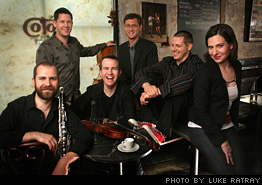
The contemporary music group eighth blackbird delivers provocative and engaging performances to its ever-growing audiences. The ensemble attracts legions of fans to its performances and recordings, which sparkle with wit and pound with physical energy. As a result, these new fans become drawn into the ever-evolving soundworld of new music, which the group inhabits and explores with comfort, conviction, and infectious enthusiasm.
Eighth blackbird is widely lauded for its performing style—often playing from memory with virtuosic and theatrical flair—and for its winning campaign to make new music accessible to wide audiences. A New York Times reviewer raved, “eighth blackbird’s performances are the picture of polish and precision, and they seem to be thoroughly engaged … by music in a broad range of contemporary styles.” Profiled in the New York Times and NPR’s All Things Considered, the sextet has also been featured on Bloomberg TV’s Muse, CBS News Sunday Morning, St. Paul Sunday, Weekend America, and The Next Big Thing, among others. The group is in residence at the University of Richmond in Virginia and the University of Chicago.
The sextet has appeared in Canada, Mexico, the Netherlands, South Korea; at nearly every major chamber music venue in North America, with performances at Carnegie Hall, Alice Tully Hall, the Metropolitan Museum, Kennedy Center, Library of Congress, Cleveland Museum of Art, and La Jolla Chamber Music Society; and has been concert soloist with the Utah Symphony and the American Composers Orchestra. During the summer, the group has appeared several times at Cincinnati’s Music X, the Great Lakes Chamber Music Festival, Caramoor International Music Festival, and Norfolk Chamber Music Festival, also performing at Tanglewood, Ojai, New York’s 20th annual Bang on a Can Marathon, and Bravo! Vail. The group is music director for the Ojai Music Festival’s 2009 season.
Since its founding at the Oberlin Conservatory of Music in 1996, eighth blackbird has actively commissioned and recorded new works from such eminent composers as Steve Reich, George Perle, Frederic Rzewski, and Joseph Schwantner, and has commissioned groundbreaking works from a younger generation (Jennifer Higdon, Stephen Hartke, Derek Bermel, David Schober, Daniel Kellogg, and Carlos Sánchez-Gutiérrez). The group was honored in 2007 with the American Music Center’s Trailblazer Award and a Meet The Composer Award. eighth blackbird received the first BMI/Boudleaux-Bryant Fund Commission, was the first contemporary music group to win the Grand Prize at the Concert Artists Guild International Competition, won the 2000 Naumburg Chamber Music Award and the 2004 NEA/CMA Special Commissioning Award, and has received grants from BMI, Meet The Composer, the Greenwall Foundation, and Chamber Music America, among many others.
The ensemble is enjoying acclaim for its four CDs released by Cedille Records. The most recent, strange imaginary animals and released in November 2006, won the 2008 Grammy Award for Best Chamber Music Performance, and has garnered an almost unprecedented number of rave reviews, both in the U.S. press and internationally. The Absolute Sound wrote of the album: “Like the band itself, all the music is fresh, vibrant, exciting, and slightly addictive .… I don’t know what eighth blackbird has planned for the future [but] whatever comes next, their track record strongly suggests that it will be great.”
The Prima Trio
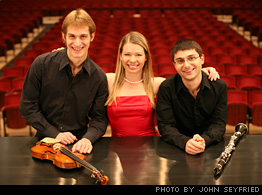
The Prima Trio swept the top awards in the prestigious Fischoff National Chamber Music Competition in 2007, winning the grand prize and gold medal only three years after their genesis at the Oberlin Conservatory of Music. Their Fischoff win launched them on a series of concerts throughout the Midwest, and in 2008 they performed at the Emilia Romagna Music Festival in Modena, Italy. They also presented concerts in Germany in 2008 and they appeared on the Cleveland Chamber Music Society’s performing arts series and on Florida’s “Big Arts” series. They have been featured on WCLV, Cleveland’s classical music radio station, and on 89.7 WKSU.
Each of the trio’s members—violinist David Bogorad, clarinetist Boris Allakhverdyan, and pianist Anastasia Dedik—are competition laureates in their individual careers. Each of them plays with passion, intelligence, and artistry. When the three of them perform together, the combination is electrifying.
In addition to their Oberlin concerts in Seattle at Illsley Ball Nordstrom Recital Hall in Benaroya Hall and in San Francisco at the Palace of Fine Arts Theatre, the Prima Trio’s performances in 2009 include several more concerts in California: at the Athenaeum Music and Arts in La Jolla, the Sunset Concert Series at St. Luke’s Church in Los Gatos, and in Sonoma at the Sonoma Classical Music Society. They are also scheduled to appear at Dumbarton Oaks in Washington, D.C. and on the Artist Series at Florida A & M University in Tallahassee.
Anastasia Dedik, piano
Russian pianist Anastasia Dedik began her piano studies with her mother at the age of five. In 2004, following many years of study, Ms. Dedik earned Bachelor and Master of Music degrees from the St. Petersburg Conservatory in Russia. In 2006, on a talent scholarship, she earned an Artist Diploma degree from the Oberlin Conservatory of Music, studying with Professor of Piano Sedmara Z. Rutstein. In 2008 Ms. Dedik continued her education at the Juilliard School.
Ms. Dedik has performed as a soloist and featured pianist with orchestras in Russia, Germany, Italy, Greece, Slovakia, Poland, Finland, Estonia, Holland, and the United States.
Her 2007-08 solo concert season included three performances at Carnegie Hall, a performance at the Bechstein Salon in New York that was broadcast on ABC television, a recital and master class at the University of South Dakota, and solo recitals in Italy, Germany, and Russia.
Ms. Dedik’s debut solo album was recorded live while she was on tour in Italy; GPM Records (Recco, Italy) released the CD in February 2008.
Ms. Dedik has won top prizes in numerous international piano competitions dating back to 1994, when she took second prize in the Musique de France International Piano Competition in Paris. She was a first-prize laureate at the Russian International Piano Competition (San Jose, California, 2005); the Lee Biennial Piano Competition (Sioux Falls, South Dakota, 2006); the Rovero d’Oro International Piano Competition (San Bartolomeo, Italy, 2006); the Buono and Bradshaw International Piano Competition (New York, 2007); the Asti International Piano Competition (Asti, Italy); and the Oberlin Conservatory Concerto Competition (Oberlin, Ohio, 2004).
As a member of the Prima Trio, Ms. Dedik also won the grand prize and gold medal at the Fischoff National Chamber Music Competition. In 2007 she was invited to perform at the Petrushka Ball, a major fundraising event held at the Waldorf Astoria Hotel in New York City that featured Anna Netrebko, Dmitri Hvorostovsky, and Maria Butyrskaya.
David Bogorad, violin and viola
Danish-American violinist David Bogorad began his violin studies at the age of five at the local music school in Allerød, Denmark. He has performed as soloist with various orchestras in both Denmark and the United States, and he has presented recitals at numerous festivals, including the Copenhagen Summer Festival and the Frederiksværk Music Festival. He made his debut with the National Danish Radio Symphony in 2005, performing Tchaikovsky’s Violin Concerto.
Bogorad earned a Bachelor of Music degree from the Oberlin Conservatory of Music under the tutelage of Professor of Violin Milan Vitek, and he is continuing his studies at Oberlin under the auspices of its Artist Diploma program. His previous teachers include Odin Rathnam, Kurt Nikkanen, Ossur Baek, Shannon Hawes, and Anker Buch.
Bogorad is a laureate of numerous competitions. He twice won the first prize award in the Jacob Gade Violin Competition (2000, 2002), and he twice won the second prize and a special award in the Öeresund Soloist competition (2005, 2007). He won third prize in the National Danish String Competition (2007) and second prize in the Sorantin Competition (2007). In 2008 he received the Kaufmann Prize from the Oberlin Conservatory for outstanding studies in violin. He has participated in various master classes and summer programs in Denmark, the Czech Republic, the United States, and England, working with, among others, Nikolaj Znaider, Gil Shaham, Aaron Rosand, György Pauk, Sally Thomas, Jerrold Rubinstein, Odin Rathnam, Eszter Haffner, Christina Aastrand, Lars Bjørnkjær, and Anker Buch.
Bogorad plays a 1627 Amati violin that was offered to him in 2008 by the Augustinus Foundation.
Boris Allakhverdyan, clarinet
Boris Allakhverdyan, of Armenian descent, was born in Baku, Azerbaijan, in 1984. He began taking clarinet lessons from his father at the age of nine, and later entered the Moscow Conservatory Pre-College Division. Upon his graduation in 2001, he was accepted to the Moscow Tchaikovsky Conservatory, where he studied with Professor Raphael Bagdasarian and earned a Bachelor of Music degree, with honors, in 2006. He earned an Artist Diploma from the Oberlin Conservatory of Music in 2008, following studies with Associate Professor of Clarinet Richard Hawkins. While at Oberlin, he won the school’s prestigious Concerto Competition and was a member of the Oberlin Chamber Orchestra. He is currently enrolled in the Master of Music program at the Cleveland Institute of Music, studying with Franklin Cohen.
Allakhverdyan has won numerous competitions, including first prize at the Hellam Young Artist’s Competition (Springfield, Missouri, 2007) and second prize awards in 2000 at the Rozanov International Clarinet Competition (Moscow) and the Rimsky-Korsakov Clarinet Competition (St. Petersburg, Russia). He has performed as a soloist and with orchestras in Russia, Germany, Denmark, Venezuela, and the United States. He has also participated in numerous music festivals, including the International Music Festival (Offenbach, Germany); the Musical Kremlin Festival (Moscow); and the Hampden-Sydney Music Festival (Hampden-Sydney,Virginia). In 2007, Allakhverdyan attended the Lucerne Festival Academy in Switzerland, under the direction of Pierre Boulez, and the Norfolk Chamber Music Festival of the Yale School of Music. In March 2007, he won an audition for the second clarinet position of the Youngstown Symphony Orchestra in Ohio. He has performed with the Cleveland Orchestra, covering the second clarinet chair, and, during the summer of 2008, he was principal clarinet of the Colorado Music Festival Orchestra, under the direction of Michael Christie ’96.
Members of the
Oberlin Contemporary Music Ensemble
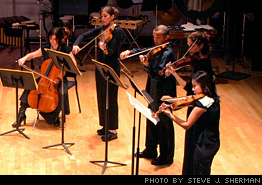
Winner of an award for adventurous programming from the American Society of Composers, Authors, and Publishers (ASCAP) and the American Symphony Orchestra League in 2002, Oberlin’s Contemporary Music Ensemble (CME) is considered one of the premier new music ensembles in higher education in the United States. Directed by Timothy Weiss, the Conservatory’s Ruth Strickland Gardner Professor of Music, the CME performs music of all styles and genres, with a repertoire that is as broad as the entirety of contemporary music. In addition to giving first performances of new works by prominent composers, the CME has also premiered works by student, faculty, and alumni composers.
Many famous and respected new music performers have been guest soloists with the CME, including Marilyn Nonken, Stephen Drury, Jennifer Koh ‘97, Steven Schick, and Ursula Oppens. In May 2005 the CME performed two concerts of works by Sir Harrison Birtwistle, who was in residence at Oberlin. In February 2007, they were the pit orchestra for the U.S. Premiere of Olga Neuwirth’s opera Lost Highway, earning critical acclaim for their performances in Oberlin and at New York’s Miller Theatre. Oberlin has long been an undergraduate haven for many nationally renowned composers, chamber musicians, and ensembles; several rising young performers of new music began their careers as members of the CME, including eighth blackbird and the International Contemporary Ensemble (ICE).
Oberlin College & Conservatory | 77 W College Street, Oberlin, Ohio 44074 | 440-775-8200 | Contact | Directories | Search
